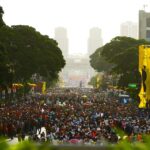
The president of the news network TeleSUR, Patricia Villegas Marín, criticized the ban on Sputnik and RT issued by the European Union, stating that Europe is using the “silencing of media as war missiles.” Other journalists from Venezuela, consulted by Sputnik, also condemned the EU information blockade.
On Monday, February 28, Josep Borrell, the EU high representative on external affairs, announced during a virtual ministerial meeting that the European Union will place a ban on Sputnik and RT’s broadcasts. In response, the editor-in-chief of Russian state media, Margarita Simonyan declared, “We know how to do our work in conditions of prohibition.”
Sputnik asked for the opinions of some journalists and communicators from Venezuela on the matter. Some of the responses are presented here.
Silencing of media [functioning] as war missiles
Patricia Villegas Marín is a Colombian journalist based in Caracas. She is the director of the Latin American television network TeleSUR. Villegas responded to Sputnik that “in the name of democracy, voices are being silenced.”
“We at TeleSUR have experienced [this type of blockade] many times at decisive moments in the political life of Latin America and the Caribbean,” she commented.
RELATED CONTENT: Venezuela Denounces EU Censorship of RT & Sputnik
“You cannot add by subtracting, let’s have it clear!” continued Villegas. “The obviousness of this is hidden in well-delivered speeches given by politicians who do not blush. People know it, they understand more and more that diverse points of view regarding the facts are needed in order to have a balanced personal opinion. This [attitude of the EU] is freedom of expression for one’s own convenience, and the silencing of media [is functioning] as war missiles. Yet, by turning off traditional media of communication they will not be able to silence anything; this will only multiply on the internet. People are going to organize and disseminate the message. Of course, we must keep this moment in mind for when some perfumed bigwig talks to us about freedom.”
Shaping a single viewpoint in Europe
According to Venezuelan journalist and political analyst Diego Sequera, the EU sanctions should not surprise anyone because “it is only a logical consequence of the previous steps that have been taken to reach this conclusion, and these are not only diplomatic, military or political steps, but also function as modes of control and management of information.”
Sequera stated further, “This step is hostile, openly warlike—its purpose is to shape a unique and official vision of what is currently happening, regarding the Russian Federation’s military operation.”
Sequera, a journalist for the news outlet Misión Verdad and a member of the Samuel Robinson Institute, remarked, “The current ecosystem has been taking shape since before 2016, but with the arrival of Trump and the creation of the Russian scapegoat as the responsible agent for his victory and for everything bad that has happened since then, of course Sputnik and RT are going to be considered as belligerent, hostile agents.”
“Let us remember that the reputation of the traditional media is at its worst,” Sequera also pointed out. “They are definitely war propaganda, absolutely, so any journalistic narrative that moderately contrasts and offers a different version of the facts is going to be considered a threat in itself.”
For Sequera, Russian media are even considered as an “economic threat” by the Western media, which, according to him, have an “increasingly nonexistent” reputation. “It is only logical that they [Western media], as members of the corporate system, would want to suppress Sputnik and RT.”
RELATED CONTENT: Fake News Warfare in Ukraine Conflict (+Zelensky on the Frontlines?)
According to Sequera, Europe has recognized Sputnik and RT as a threat to its hegemonic narrative about the war in Ukraine.
The EU considers itself as the sole possessor of the truth
Sergio Rodríguez Gelfenstein, a Venezuelan doctor in Political Studies and writer commented, “It is said that the first victim in a war is the truth, and in the decision taken by the European Union we have an example of this. The EU considers itself to be the sole possessor of the truth and to have the authority to prohibit any broadcast that is not adjusted to its interests in the conflict. What EU wants is for the world to only know its own truth, which is not necessarily the truth.”
For Rodríguez, the censorship measure taken by the EU “has, once more, violated freedom of the press and freedom of expression—concepts which are ultimately pipe dreams, like so many other concepts that have been paraded over the years and that crumble every time they are put to the test in situations like this. When they cannot enforce their own narrative, they resort to lying, fabricating fake news or, in an extreme case, to censoring any opinion which is not their own.”
Featured image: Sputnik logo. Photo: Sputnik/Konstantin Chalabov
(Sputnik)
Translation: Orinoco Tribune
OT/GMS/SC/EF
| Website




